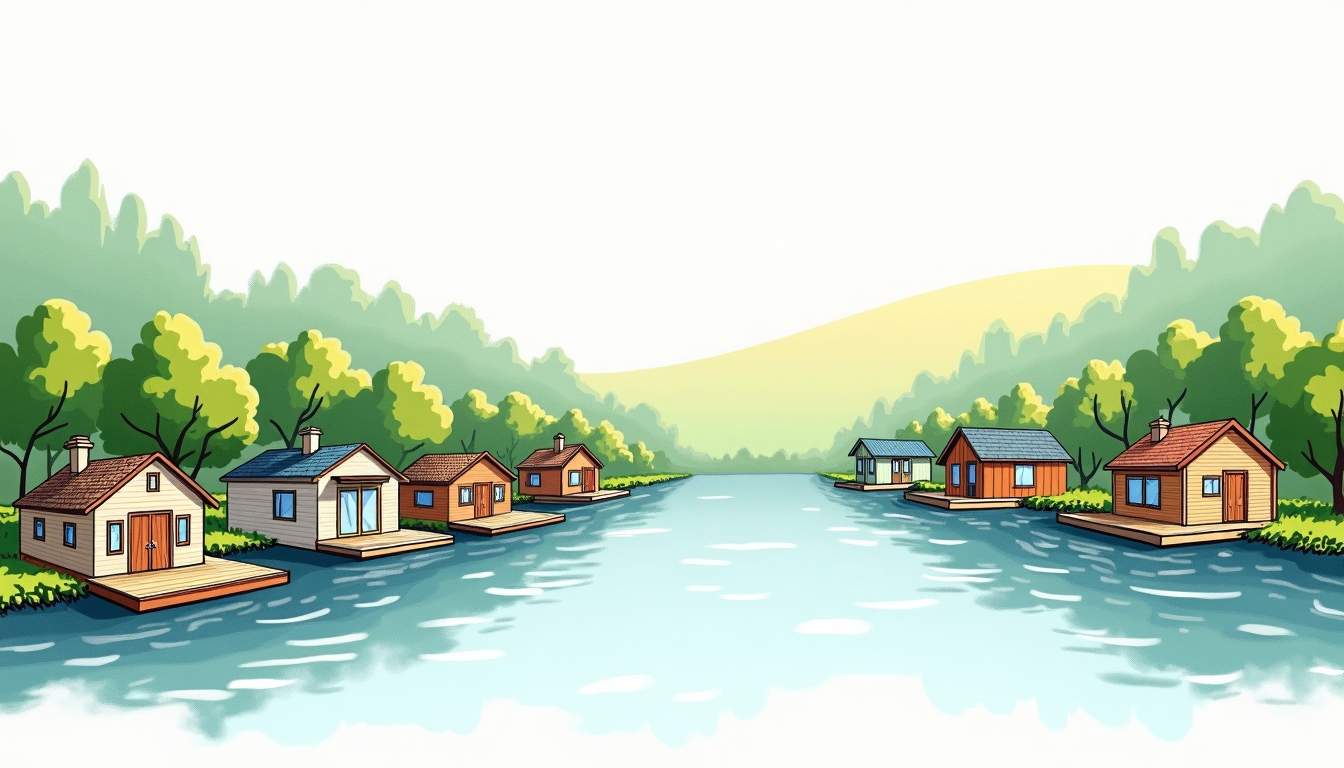
A growing number of people are discovering the peaceful rhythm of life along East Tennessee's waterways. Floating communities — neighborhoods centered around houseboats, barges, and floating docks — offer a unique blend of waterfront living without the full commitment of traditional homeownership on land. This guide outlines what to expect, where to look, and how to decide if a floating lifestyle in East Tennessee is a fit for daily life and long-term plans.
Floating lifestyle communities are organized clusters of residences and amenities built on water. They range from small pockets of a few houseboats sharing a communal dock to larger marinas and floating neighborhoods with clubhouses, walking piers, and shared services. These communities attract people who value water access, views, and a slower pace, while still wanting community connections and conveniences.
In East Tennessee, floating communities sit on reservoirs, rivers, and quieter coves where the water level and conditions are conducive to mooring residences year-round. The region’s rolling hills, forested shorelines, and mild climate create a scenic backdrop for this lifestyle without the hurricane or tidal concerns common in some coastal areas.
Residents often customize their floating homes to blend modern comforts with waterfront charm, incorporating decks, large windows, and nautical design elements that enhance the connection to their aquatic surroundings. Many communities also organize social events, boating excursions, and environmental stewardship programs, fostering a tight-knit atmosphere that balances privacy with camaraderie.
Moreover, these floating lifestyle communities emphasize sustainability and harmony with nature. Advanced water purification systems, solar power installations, and carefully managed waste disposal are common features, ensuring minimal environmental impact while supporting a high quality of life. This integration of technology and nature appeals to those seeking an eco-friendly yet comfortable living experience on the water.
East Tennessee offers several practical and aesthetic advantages for floating lifestyles. Reservoirs such as Norris Lake, Douglas Lake, and Fort Loudoun Lake provide sheltered water with relatively stable levels, which helps keep moorings and docks secure. The region’s temperate seasons make year-round living feasible, and the scenic vistas add to quality of life.
Another advantage is accessibility. Many floating communities are within a reasonable drive of mid-sized cities like Knoxville and Johnson City, making commuting, medical care, and cultural amenities reachable without sacrificing waterfront living. Local marinas also supply services like fueling, pump-out stations, and dock maintenance that make afloat living convenient.
Houseboats are the most recognizable floating residences. They range from compact, economical vessels to luxurious floating homes with full kitchens, multiple bedrooms, and modern heating and cooling. Houseboats often feel like a hybrid between a boat and a cottage, providing indoor comfort with expansive waterfront views.

Floating homes are typically more anchored and permanent than recreational houseboats. Built on permanent floats or pontoons and often connected to utilities like water, sewer, and electricity, these homes resemble their land-based counterparts in layout and finishes. They’re a popular choice for people seeking a full-time residence on the water.
For those who prefer mobility, liveaboard boats offer an option to move seasonally or explore different coves and marinas. While often smaller than purpose-built houseboats or floating homes, liveaboards provide a different kind of freedom and usually require a marina slip that permits long-term mooring.
Norris Lake is favored for its clear water and undeveloped shoreline. Floating communities here benefit from quiet coves and access to recreational activities like fishing and boating. Several marinas on Norris provide slips, repairs, and community events aimed at floaters and seasonal visitors.
Douglas Lake offers extensive shoreline and numerous coves ideal for anchoring a floating home or houseboat. Marinas in this area cater to a mix of weekenders and permanent residents, and the lake’s warm-water reputation makes it popular for swimming and wake sports.
Closer to urban centers, Fort Loudoun Lake strikes a balance between convenience and waterfront living. Its proximity to Knoxville makes it attractive to commuters who want waterfront living without being remote, and marinas here often have well-developed facilities and active boating communities.
Shared docks provide essential access for boaters and residents, and are often the social spine of floating neighborhoods. These spaces typically include power pedestals, water hook-ups, and common lighting. Well-managed docks make daily living smoother and create natural gathering spots.
Many floating communities maintain clubhouses, picnic areas, and waterfront recreation options. These amenities foster a sense of neighborhood and offer indoor and outdoor spaces for events, meetings, and casual socializing, which can be particularly important during inclement weather.
On-water living comes with maintenance needs that differ from land-based homes. Good communities either provide or are located near professional services for hull maintenance, electrical work, septic/pump-out systems, and seasonal dock care. Anticipating these needs helps avoid unpleasant surprises.
Understanding the legal structure of the floating residency is essential. Some properties are sold as owned slips or floating home titles, while others operate as leaseholds where the resident leases dock space or the platform. Each arrangement has implications for financing, property taxes, and resale.
Local and state regulations govern where floating homes can be located, how they must be moored, and environmental rules related to sewage and waste disposal. Working with a marina or community association knowledgeable about these rules helps ensure compliance and long-term sustainability.
Insuring a floating residence requires policies tailored to marine and residential risks. Coverage needs usually combine elements of homeowners and boat insurance, covering hull, liability, contents, and potentially pollution liability. Comparing options from brokers experienced with floating properties is recommended.
Costs vary widely depending on size, build quality, and location. Floating homes in well-serviced marinas or desirable coves typically command higher prices. Beyond the upfront purchase, ongoing expenses include slip fees, utilities, dock maintenance assessments, insurance, and routine marine upkeep.
Financing can be more complex than standard mortgages. Some lenders offer specialized loans for floating homes and liveaboards, but terms may differ from traditional home loans. Cash purchases are common in some markets, and working with lenders who understand marine property ensures clearer expectations about rates and loan-to-value ratios.
Although East Tennessee experiences milder storms than coastal regions, seasonal weather still matters. Winter freezes can stress systems and require winterizing plumbing, while summer storms can bring strong winds and elevated water movement in some areas. Proper mooring, regular maintenance, and emergency plans are essential for safe, long-term living.

Floating communities often organize collective storm preparedness, such as reinforcing moorings before predicted weather or sharing resources for emergency hauling or repairs. These cooperative measures provide resilience and reduce individual risk.
Living on the water emphasizes interdependence. Dock safety, waste management, and noise control are often governed by community rules. Active participation in a community association or marina board helps maintain a cooperative and respectful atmosphere where shared responsibilities are clear.
Floating communities tend to be social hubs where neighbors meet on docks, at clubhouses, or on shared excursions. Activities can include potlucks, fishing tournaments, boat parades, and maintenance co-ops. Such events build camaraderie and make the floating lifestyle feel less isolated.
Because of the close proximity of residences and the unique acoustics of water, quiet hours and considerate behavior are often enforced. Respecting wake restrictions, guitar volume, and docking protocols preserves the peaceful ambiance most residents seek.
Start by visiting marinas and floating neighborhoods at different times and dates to get a sense of daily life and seasonal shifts. Talk to current residents about costs, maintenance, and expectations. Assess the condition of moorings, electrical hook-ups, and any visible wear on hulls and docks.
Consider lifestyle compatibility: will proximity to nightlife or services matter, or is remote serenity the objective? Evaluate the commute, emergency services access, and community culture. For those planning to live on the water full-time, arrange for mail forwarding, reliable internet, and access to healthcare providers.
Protecting water quality is essential. Floating communities must observe regulations for sewage, graywater, and fuel handling. Using eco-friendly cleaning products, proper pump-out services, and responsible waste disposal all reduce impact on aquatic ecosystems and preserve recreational value.

Habitat awareness is also important; boaters and floaters should be mindful of nesting birds, aquatic plants, and fragile shoreline features. Community guidelines often include no-wake zones near shallow beds or wildlife areas to protect both habitats and property.
The floating lifestyle suits those who value views, proximity to water, and a quieter pace, while still appreciating community amenities and services. It requires a willingness to trade some conveniences of land-based living for the serenity and character of life on water.
Prospective residents should weigh financial considerations, maintenance demands, and legal arrangements before committing. For many, the daily sounds of water, the ease of launching a kayak from a private dock, and the sense of living closer to nature make the trade-offs worthwhile.
Exploring floating communities in East Tennessee benefits from research, on-site visits, and conversations with residents and marina managers. Prepare questions about ownership structure, mooring security, community rules, and long-term plans for the marina or neighborhood.
With thoughtful planning and realistic expectations, living in a floating community can offer a distinctive lifestyle that blends waterfront access with friendly neighbors and regional conveniences. For those drawn to water’s steady calm and the slower rhythms it encourages, East Tennessee’s lakes and reservoirs present inviting alternatives to traditional land-based neighborhoods.
Embrace the tranquility and charm of waterfront living at Tennessee National, a premier gated community that complements the floating lifestyle experience with luxury and convenience. Enjoy access to a Greg Norman Signature Golf Course, a private marina, waterfront dining, and over 20 amenities designed to elevate your daily life. Whether you seek a move-in ready home or a custom build, Tennessee National offers exceptional living options surrounded by scenic nature trails and vibrant social clubs. Schedule a Private Tour today and begin your journey toward resort-style living on the water’s edge.